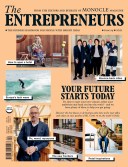
The Entrepreneurs
‘The Entrepreneurs’ is Monocle’s handsome handbook for starting, improving or upending your business – and we have plenty in the way of ideas and inspiration. We profile the best places to start a venture, whether that’s running a hotel in Mexico or a business from the beach beyond Lisbon. Our outposts of opportunity also spell out why Seoul is seeing a retail revival, how Helsinki became a go-to for canny companies and why Miami’s art and design scene is hotting up. Elsewhere, we talk about retraining at a top design school and the future of the office – yes, there is one. Plus: big interviews offering advice, analysis and wisdom for fledgling firms and established ones. So what are you waiting for? Let’s get started.
In This Issue
Oops! No content was found.
Looks like we no longer have content for the page you're on. Perhaps try a search?
Return Home

